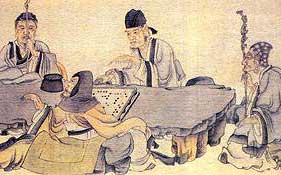Factors Contributing to Aging from a TCM Perspective
 Traditional Chinese Medicine (TCM) has a long history in exploring aging problems, for example, many ancient sages were able to live to a ripe old age. It is well accepted that spontaneous degeneration occurs to a certain extent with age, and this natural life cycle is irreversible and unavoidable. However, if we know how our body goes through this degeneration process, it is possible to slow it down or at least make us age gracefully.
Traditional Chinese Medicine (TCM) has a long history in exploring aging problems, for example, many ancient sages were able to live to a ripe old age. It is well accepted that spontaneous degeneration occurs to a certain extent with age, and this natural life cycle is irreversible and unavoidable. However, if we know how our body goes through this degeneration process, it is possible to slow it down or at least make us age gracefully. Aging involves a complex and varied process, with modern medicine focusing on exploring it on a molecular or biochemical level. Scientists have suggested various aging theories, and currently, the most widely accepted ones are the free radical damage theory, the hormonal theory, the telomere (sections of DNA) theory, the genetic control theory, and the wear-and-tear theory. Briefly put, these theories hold that the aging process is either genetically programmed or influenced by extrinsic factors.
TCM views aging from a functional aspect, with physicians believing that age-related changes are mainly due to organ degeneration and exhaustion of fundamental substances. Aging is generally contributed to the following changes inside the body.
Exhaustion of fundamental substances
The human body is understood to be a continuous dynamic system, in which fundamental substances such as qi (vital energy), essence (jing), blood, body fluids and spirit (shen) interact together to create the activities making up life. With aging, the source of these substances weakens and becomes depleted, and bodily activities slow down. This is reflected in the common signs of ageing such as muscle shrinkage, fragile bones, loose skin and gray hair.
Degeneration of organs
Over time, our body loses the ability to repair and regenerate itself; this brings about inevitable wear-and-tear on the body. One of the most significant changes occurs in the kidney. As the store of essence depletes, it fails to play the role of propelling overall physiological functioning leading to a decline in vitality. Furthermore, the spleen which serves as the source of nutrient essence can no longer ensure proper replenishment and nourishment of the body, thus greatly contributing to aging.
Accumulation of metabolic wastes
Environmental influences or lifestyle habits such as overeating, physical overstrained, inadequate exercise and stress facilitate the body to accumulate metabolic wastes. With aging, the function of the internal organs slow down and can no longer eliminate bodily wastes effectively; in particular, blood stasis and phlegm, which in turn further disturb the circulation of blood and qi, damaging the organs and inhibiting the replenishment of fundamental substances. For example, common signs of aging like skin pigmentation, cataracts, numbness, muscle pain, varicose veins, abnormal pulse or hypertension are all associated with blood stasis in TCM.
Basically, TCM holds that a deficient body and excess pathogens are the root of aging. As these two aspects aggravated with age, degeneration inside the body becomes an irreversible process. Aging should not be considered as an individual disease or syndrome, it is an overall deterioration change of the body, involving almost every part or organ of the body. Aging signs will be more and more complicated with age. To slow down aging, one remedy does not fit all. In TCM holistic view approach, besides the aging signs of the body, physicians also take into account factors like geographic location, sex, age, life habits and past medical and family histories when prescribing a course of anti-aging therapy. Therefore, TCM remedies to slowdown aging are comprehensive and are customized to individual conditions, the primary therapeutic goals are nothing more than above mentioned, that replenishing fundamental substances, boosting organ functioning and eliminating metabolic wastes.


